- Home
- Leslie North
Redeeming the Rancher Page 5
Redeeming the Rancher Read online
Page 5
“What happened to ‘junky?’”
“That was before I saw you with the truck.”
“What do you mean?”
“You’re different when you’re here.”
“Different?” She had no idea. “Here” meant around her. Still, he engaged, going so far as to lean against the rusty frame if it meant a closer look.
“Less…guarded. More authentic.”
“Rather presumptuous, you think? You know nothing about me.”
“I know what Daniel wrote.”
His buddy’s name was an ice bath to the flirtation. Wes bristled, distanced himself, returned to arranging his tools. When her voice came again, it was bright—too bright—as if she, too, mourned something lost in their rapport and was attempting to drive the conversation out of the ditch.
“To recreate history, to take a complex machine that no longer works and make it hum, to make it beautiful again? I could never do anything so amazing.”
“Isn’t all that different, except I know what the end result looks like. You create that all on your own.” His words came out with an edge. He loved Daniel like a brother, but if she insisted on bringing up ancient history every time they were together, sharing a barn—sharing anything—wasn’t going to happen.
“I want to drive it. Someday.”
He didn’t answer.
“Wes?”
He turned, arms crossed. “You be around in twenty years?”
“It won’t be that long. Say you’ll let me. Even if we only talk about it.”
“I’ll let you drive it.”
Her feet slipped free of the door. She scooted behind the steering wheel and adjusted the tiny, oval-shaped rear mirror as if there were a parade behind her and she wanted to take a good look at the fanfare. A smile stretched beneath the flush of her cheeks, raised her glasses just so. Her quiet theatrics, only in front of small audiences, seemingly only in front of him, seemed a window into her world. How nice it must be to live on a plane of creation, always the cause, rarely experiencing the fall out.
“And we’ll light up a cigarette—even though I don’t smoke—just to pretend to use the ashtray. And you’ll stand on the side things.”
“Running boards?”
“Right. Running boards.”
She drew him back in—some kind of infectious crazy that tapped into the way Clem had told stories of the ranch back in the day, the way work wasn’t the only thing they used the running boards for, the light in his grandfather’s eyes the day he told Wes that he wanted him to have his pride and joy—the first thing he had bought after the war, the truck in which he convinced his love to spend her life with him. Wes pictured it all now, and the history filled him as much as the wonderment on the face of the most captivating woman he’d ever met. He pointed to the roof’s underside and filled the conversation with words so he wouldn’t kiss her.
“Used to have handles here for the farm workers to hold onto at harvest time.”
“So, it’ll have handles again.”
“Right.”
For that span, in her plane of creation, he imagined the truck upon completion, full restoration: Bright Coach Maroon with patches of worn patina preserved under a glossy coat; freshly sanded, cut, and stained oak bed boards; the softest buff-colored leather covering a plump fill around the seat springs. Not in twenty years, but in the time it took her to erect a statue on Main, and it made his knees weak from the possibility, from the temptation to make a fully restored 1939 Ford truck a reality sooner rather than later.
“If I didn’t know better,” he said, “I’d say you’re starting to change your mind about sharing the barn with this truck.”
She shimmied closer, back to where the passenger seat would be, sat all prissy-like, ramrod straight, and politely cleared her throat. After a stretch of zero response, she said, “I sure hope you don’t lose those Southern manners in the twenty years it takes to finish.”
Wes realized that she hinted at the way he had always opened the door for her. Still inside a game they were both reluctant to leave. He complied, and she bounded out and turned, alive and energetic, the contrast of darkness and light: dark tendrils of barely-there curls down her back, smoky frames, and skin paled by the night. Her scent, an orchard, maybe—vaguely fruity but masked by long stretches in the sun—replaced that of grease and synthetics used to clean metal.
Face to face, her gaze traveled his features.
He stared back, heated, the first twitch of hardness twisting through him. This time, she didn’t have to say the name for him to be there, between them. Daniel. How he was there one moment and gone the next. How he must have thought of his family, of her, in his final moment when his lungs no longer pulled enough oxygen, instead of realizing what Wes had done to get them to that moment.
Wes glanced away, shattered the moment, as he had Daniel’s final one in this life.
“Olive…” he whispered, by way of explanation.
But she knew. She, too, backed away and slipped around a curve of distance—emotional, physical, sexual.
“I should go,” she said, the power behind her voice barely enough revolutions to generate sound. She padded away, her soundless feet against the whispering hay.
Wes nodded. With nowhere left to go, his sanctuary gone, beyond the hay wall simply wasn’t enough space. The moment she was out of sight, he snagged a wrench, hummed it at the barrier, and stormed out of the barn.
6
Over the next two weeks, more rented equipment filled the barn—things that ran on motors and required industrial-length power cords and a backup generator and safety goggles. Had Wes been oblivious to the undertaking behind the hay wall, he might have decided she was constructing a Boeing aircraft for all the bizarre belches of noise and intermittent cursing that rained down on Clem’s truck like those heated summer storms that snuck up and surprised you.
For the most part, Wes kept to his word to stay on his side. Since Olive had planted the seed all those days ago, his motivation to make progress on the old truck shifted into overdrive. She wasn’t the only one accepting deliveries. Nearly every day was like an early Christmas, except what filled the boxes was what most would consider scrap parts. Wes aimed for authentic but wasn’t above substituting a creative solution every now and then.
He always heard her but rarely saw her. With one exception.
On a night not unlike the others, when Wes had shared an inch of whiskey with Willie on the back porch—tapped from Clem’s reserve because it was the anniversary of when he and Willie went into ranching together, forty-eight years earlier—Wes retreated to the barn and heard the biggest carrying-on Olive had ever brought to his barn. The female noises raining down on him were closer to a wild night of sex—breathless grunting mixed with moaning and bringing the Almighty into things. Wes blamed the liquor for floating his libido into images of her riding him, his instant erection. It came down to a cold shower or a peek.
A peek was immediate, more befitting his current drive.
What he saw was the single most unsexy thing he could have witnessed: Olive lying on the plywood platform between two lengths of pipe that loosely resembled a human figure’s legs, a full-mask over her face. She had a gruesome tool for cinching in one hand and a welding torch in the other, aimed directly at what he assumed was the statue dude’s junk. Apparently, it wasn’t going well. The blowtorch was clogged—the grunting and moaning was on account of a too-tight bracket she failed to loosen, and the Almighty was just along for the frustrating ride. In the time it took him to bark out one laugh, he thought to extend an offer to help, but the velocity with which she ripped off her welding mask sent him in full retreat behind the partition. Certainly not the gentle, reverent, and quiet worldly soul who had ingratiated herself to the entire Meier clan faster than a prairie fire with a tailwind.
Two exceptions, really.
On a night much like the other, except he was stone-cold sober, Wes didn’t hear the sounds of wild se
x. He heard crying.
“Olive?”
Silence.
“Olive, what’s wrong?”
“The bracket snapped off and the foam won’t stay in place and I wanted him to have a taste of vintage surrealism, because that’s what people expect from me, but in reality, he’s going to look like a cross between a bowlegged cowboy and one of those aliens with the too-long body because he’s stretched out, and I’m really hungry. Like enough to eat him before I even get the clay on his bones.”
A smile tickled Wes’s lips. He reached over to the clipped scarf attached to the pully cable—largely unused but for the occasional hey, that song is grating on my last good nerve when the radio decided to belch out the newest country-pop hit—and ran the cloth up the pully like a flag of truce to their silly rules.
“Can I come over?”
“No.”
“No?” He was incredulous. Speechless. Utterly without a tether to what should come next. One minute stretched to two. She hadn’t started crying again, but she hadn’t wrapped up their little discussion, either. Just when he was about to leave her to her crippling artist insecurities, her voice penetrated the barrier, his heart.
“May I come over?”
A chuckle slipped loose of his throat, more of a can-you-believe-her? to his subconscious mind. They had stared at the inside of these weathered boards, this stupid hay bale wall, for too long. He had a better idea.
“Put on your shoes.” He shook his head at how much, after only two weeks, he knew her. She was never in her creative zone with footwear. “And grab your coat.”
“Where are we going?”
“Artistic field trip.”
“The Gritty Somewhere?”
“Better.”
“The Starlite Motor Lodge?”
As tempting as that sounded, he digressed. “Better.” His tone betrayed all he really thought of the no-tell-motel. “You really should get out more.”
“I’d love to, but we’re kind of in the middle of nowhere.”
She rounded the barrier, looping a plump scarf around her neck. The loose weave held her hair hostage. Her wide, unguarded eyes were rimmed red; the tip of her nose was pink. It was the first he had seen her without her glasses.
“Just how I like it.” Exactly what he’d intended to say, but the words stalled, a near-death on his tongue.
She covered her face with her hands. “I know. I look a fright.”
There it was again—not quite an accent but entirely foreign. Magnetic.
He lifted her hands from her face and placed them at her side. “You look like art.”
Olive smiled, unconvincingly.
Wes tugged at the ends of her scarf, which drew her closer. Close enough that the short wisps sweeping her forehead snagged the day’s beard growth. He planted a soft, soundless kiss on her forehead through the soft strands. Somehow, it felt right. Acceptable. Within rules.
“Come on.” He took her hand and tugged her out into the night.
He hoped the chill would return him to his senses.
“A rowboat?”
Livie just thought the Meier ranch was in the middle of nowhere. This, this twenty-minute-drive-away grassy knoll beside a lake and train trestle and a closed-up barn with a sign that read “Dietrich’s”—this was the true middle of nowhere. The moon hid behind the dense trees, but the clarity of the blue-black patch of twilight over the lake was extraordinary. Her chest filled with gratitude that she had something to look at beyond metal pipes and fittings that never seemed to resemble the human form. Probably because she had yet to finish sketching the most important part: the soldier.
That, she reserved for a moment when it all seemed agreeable. When Wes opened up and told her what he always seemed to be reaching for when he made eye contact. Then, the entirety of the sculpture would take shape in her mind.
Wes helped her into the two-seater, secured the oars and a blanket from his truck, and kicked away from the shoreline. Something about it all was familiar.
“If I didn’t know any better, I’d say you’ve done this before.”
“Who hasn’t in this town? But this is a special tour. Not just anyone gets to see what I’m fixin’ to show you.”
“I’m absolutely positive you’ve said that before.”
“Funny.” He rowed, his sweeps of the glass-like surface absent, unhurried. “Contrary to my first—or rather, my second—impression, I’m not the playboy you seem to think.”
“I find that hard to believe.”
“Why?”
“Look at you…you’re like G.I. Joe and Léon Bonnat, all rolled into one.”
“Who’s Léon Bonnat?” His drawl made a complete butchery of her French emphasis, just this side of mocking.
“Nineteenth century French painter? Chiseled cheeks? Never mind.”
Wes elevated the mocking to a sing-song level. “Someone has a dead crush.”
Not so dead, if anyone asked.
“I know you didn’t bring me all the way out here to discuss a pseudo-Impressionist who stressed simplicity in all things but his self-portrait’s gorgeous eyes.”
Wes chuckled. Enough to disrupt the easy rowing rhythm he had established.
“What?” Defensive, sure, but Livie had already divulged too much physical adoration toward a man who would have to be a corpse to not know what he did to women.
“Nothing.”
But it wasn’t nothing; it was definitely something from the inordinate length of time it took his smile to fade, how he stared straight at her when he was annoyed but in moments like this, when he didn’t seem to mind sharing his space and his life so much, he barely held her gaze.
“See the third bent from the right?” He nodded in the direction of the trestle.
“The one that looks like all the others?”
“At first glance. But the townspeople know different. The site of a tragedy. Back in Clem’s day, there was a woman named Eliza Grace who came to town. An outsider…”
“Naturally.”
“She was courted by two men. Milo was the son of a preacher. He had the Brylcreem hair and the future, taking over the pulpit after his daddy, plans to expand on the church because worshippers were thick as fleas come Sunday morning. Then there was Truman. Helluva name he never could live up to. Truman built things with his hands, picked up odd jobs around town, had a fascination with magic—card tricks, slight-of-hand, that sort of thing. No future to speak of, but Eliza Grace—she just kept coming back, and eventually, they fell in love. Trouble was, by then she had already married Milo, who had made it his mission in life to convince the good people of Close Call that Truman was the devil—or something close to it—and drive him clear out of town.”
The boat drifted closer to the trestle, seemingly pushed by a conspiracy of the natural world, and Livie remembered what was familiar. Daniel had written her something about a lake and a bridge and a tale. She shivered, nothing to do with the cold.
“Truman knew that he and Eliza Grace could never be together so long as she was married—divorce from a man of God was nearly unheard of back then—and so long as he was the most shunned man in the county. He came up with an idea to create the most elaborate illusion he had ever pulled off. He studied the train routes, which were regular enough to set a clock by in those post-war days, and decided that if he could make the townspeople believe that Eliza Grace took an accidental spill off the trestle from an oncoming train, they would eventually stop combing the lake for her and assume her body had travelled on down the river. Then they would be free to be together.”
Wes gave a dramatic pause to the story. Livie practically tossed him overboard from the suspense. One stroke, two, then three, all gliding them closer to the third bend, the crisscrossing beams of the support becoming clearer. Her toes curled inside her boots.
“But the night everyone in town was gathered at a church social,” Wes continued, “Eliza Grace snuck down to the trestle where he hid out as he was practic
ing his illusion and believed she saw him, dead on the rocky shoreline below. In a fit of grief, she jumped to her death. And seeing what had happened, Truman climbed the trestle and did the same. But that’s not where the illusion ended.”
The moon slipped clear of a shadowy block of trees, just in time to be eclipsed by the steel trestle above.
“People say you can only see it from a rowboat, the only angle from which Truman’s illusion didn’t work…”
It. Oh, God. Livie’s breath came out in shallow puffs.
“Eliza Grace will show you your one true love, the way she saw Truman that night, as a way to ensure no one else will ever know the same star-crossed fate.”
Wes pointed. Livie’s pulse raced. She turned to see the lake meet the shoreline, the cliff whose glossy, black surface collected moonlight to look like a waterfall, ice, something iridescent, and a secondary reflection that may or may not have existed.
7
What Livie didn’t see from the rowboat was a face.
Her one true love.
She glanced back at Wes. His smile was unparalleled, collected moonlight, an illusion of its own. Happiness where she knew sadness pooled. Happiness that an outsider could not deliver with all of her bronze and words of encouragement. She felt silly, lured by the promise of an image, answers, inspiration, some truth greater than collective town lore. And she felt silly because she wanted to see someone, to know she would not be so alone.
Livie stared up as the beams slipped past, let the breeze dry her eyes, and thought to sketch the imposing structure, this angle of hope so many believed in, when she returned to her bed. Everyone, she supposed, wanted to see someone.
Wes leaned forward, elbows resting on his knees, oars resting across his legs. He looked amazing and unreachable, and the fear of the story became real. Though she wanted every happiness for him, she could not have it for herself. As Eliza Grace had discovered, love in any form was an illusion, just as Livie’s parents’ marriage had been. Happiness never coexisted with truth. And truth was the only place where her greatest art lived.

 Elkin Brothers Christmas: The Complete Series
Elkin Brothers Christmas: The Complete Series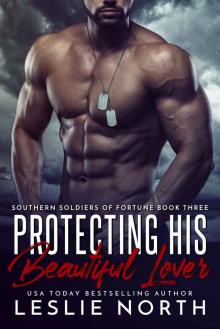 Protecting His Beautiful Lover (Southern Soldiers of Fortune Book 3)
Protecting His Beautiful Lover (Southern Soldiers of Fortune Book 3)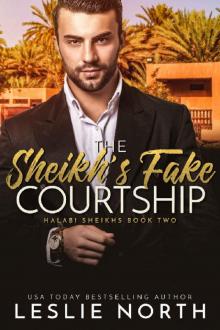 The Sheikh's Fake Courtship (Halabi Sheikhs Book 2)
The Sheikh's Fake Courtship (Halabi Sheikhs Book 2)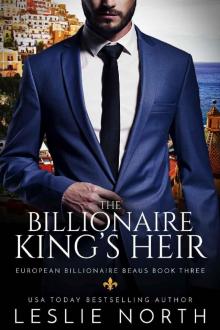 The Billionaire King’s Heir (European Billionaire Beaus Book 3)
The Billionaire King’s Heir (European Billionaire Beaus Book 3)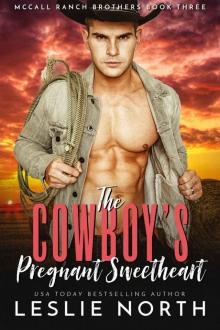 The Cowboy’s Pregnant Sweetheart (McCall Ranch Brothers Book 3)
The Cowboy’s Pregnant Sweetheart (McCall Ranch Brothers Book 3) SEAL’s Accidental Family: SEAL & Veteran Series: Book Two
SEAL’s Accidental Family: SEAL & Veteran Series: Book Two The Sheikh’s Convenient Bride (Omirabad Sheikhs Book 1)
The Sheikh’s Convenient Bride (Omirabad Sheikhs Book 1) Guarding the Single Mother (SEAL Endgame Book 1)
Guarding the Single Mother (SEAL Endgame Book 1) The Billionaire Prince’s Daughter (European Billionaire Beaus Book 2)
The Billionaire Prince’s Daughter (European Billionaire Beaus Book 2) The Sheikh’s Blackmailed Bride (Sheikhs of Al-Dashalid Book 2)
The Sheikh’s Blackmailed Bride (Sheikhs of Al-Dashalid Book 2) The Sheikh’s Fake Engagement (The Blooming Desert Series Book 1)
The Sheikh’s Fake Engagement (The Blooming Desert Series Book 1)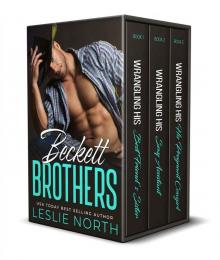 Beckett Brothers: The Complete Series
Beckett Brothers: The Complete Series The Sheikh's Untameable Lover (The Tazeem Twins Series Book 4)
The Sheikh's Untameable Lover (The Tazeem Twins Series Book 4) The Billionaire’s Second Chance Christmas (Christmas with the Denton Billionaires Book 3)
The Billionaire’s Second Chance Christmas (Christmas with the Denton Billionaires Book 3)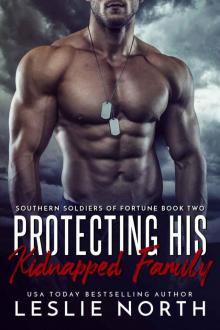 Protecting His Kidnapped Family (Southern Soldiers of Fortune Book 2)
Protecting His Kidnapped Family (Southern Soldiers of Fortune Book 2) The Billionaire’s Pretend Girlfriend (The Billionaires Club Book 2)
The Billionaire’s Pretend Girlfriend (The Billionaires Club Book 2) Sheikhs of Hamari: The Complete Series
Sheikhs of Hamari: The Complete Series The Sheikh’s Pregnant Lover (Sheikhs of Al-Dashalid Book 1)
The Sheikh’s Pregnant Lover (Sheikhs of Al-Dashalid Book 1) Sovalon Royals: The Complete Series
Sovalon Royals: The Complete Series Hasan Sheikhs: The Complete Series
Hasan Sheikhs: The Complete Series The Billionaire’s Secret Son (Preston Brothers Book 2)
The Billionaire’s Secret Son (Preston Brothers Book 2) The Sheik's Reluctant Hostage (The Quabeca Sheiks Series Book 2)
The Sheik's Reluctant Hostage (The Quabeca Sheiks Series Book 2) The Billionaires Club- The Complete Series
The Billionaires Club- The Complete Series The Sheikh’s Pregnant Love: The Karawi Sheikhs Series Book Three
The Sheikh’s Pregnant Love: The Karawi Sheikhs Series Book Three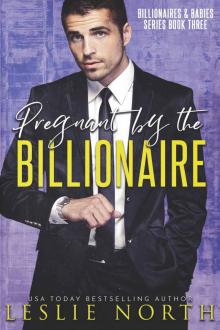 Pregnant by the Billionaire (Billionaires & Babies Book 3)
Pregnant by the Billionaire (Billionaires & Babies Book 3) The Sheikh's Surprise Twins (Qadir Sheikhs Book 1)
The Sheikh's Surprise Twins (Qadir Sheikhs Book 1) The Billionaire’s Sudden Christmas Baby (Christmas With the Denton Billionaires Book 2)
The Billionaire’s Sudden Christmas Baby (Christmas With the Denton Billionaires Book 2)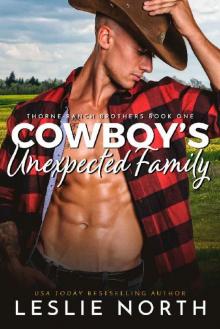 Cowboy's Unexpected Family (Thorne Ranch Brothers Book 1)
Cowboy's Unexpected Family (Thorne Ranch Brothers Book 1)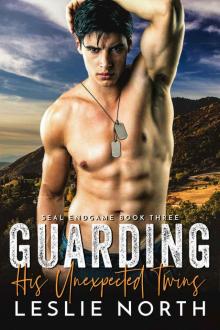 Guarding His Unexpected Twins (SEAL Endgame Book 3)
Guarding His Unexpected Twins (SEAL Endgame Book 3) SEAL & Veteran Series: The Complete Series
SEAL & Veteran Series: The Complete Series The Sheikh's Marriage Bargain (Hasan Sheikhs Book 1)
The Sheikh's Marriage Bargain (Hasan Sheikhs Book 1)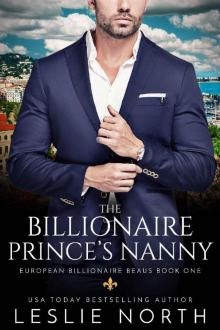 The Billionaire Prince’s Nanny (European Billionaire Beaus Book 1)
The Billionaire Prince’s Nanny (European Billionaire Beaus Book 1) The Billionaire’s Accidental Baby: Billionaires & Babies Book One
The Billionaire’s Accidental Baby: Billionaires & Babies Book One The SEAL’s Pregnant Ex (The Admiral’s SEALs Book 3)
The SEAL’s Pregnant Ex (The Admiral’s SEALs Book 3)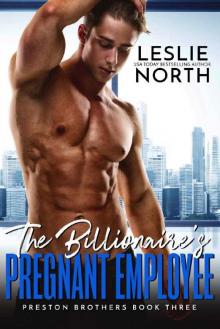 The Billionaire’s Pregnant Employee (Preston Brothers Book 3)
The Billionaire’s Pregnant Employee (Preston Brothers Book 3)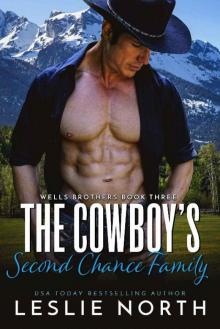 The Cowboy’s Second Chance Family (Wells Brothers Book 3)
The Cowboy’s Second Chance Family (Wells Brothers Book 3) The Sheikh’s Rescued Baby (Hasan Sheikhs Book 3)
The Sheikh’s Rescued Baby (Hasan Sheikhs Book 3)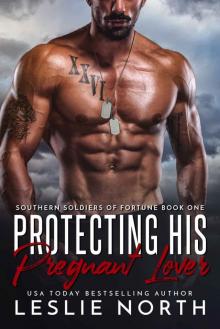 Protecting His Pregnant Lover (Southern Soldiers of Fortune Book 1)
Protecting His Pregnant Lover (Southern Soldiers of Fortune Book 1) The Sheikh’s Secret Child: The Karawi Sheikhs Series Book Two
The Sheikh’s Secret Child: The Karawi Sheikhs Series Book Two The Sheikh’s Pregnant Foreigner
The Sheikh’s Pregnant Foreigner Sheikhs of Al-Dashalid: The Complete Series
Sheikhs of Al-Dashalid: The Complete Series The Sheikh’s Wife Arrangement: The Safar Sheikhs Series Book One
The Sheikh’s Wife Arrangement: The Safar Sheikhs Series Book One The SEAL’s Instant Family
The SEAL’s Instant Family The Sheikh’s Pregnant Wife (Hasan Sheikhs Book 2)
The Sheikh’s Pregnant Wife (Hasan Sheikhs Book 2)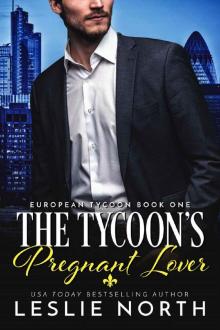 The Tycoon’s Pregnant Lover (European Tycoon Book 1)
The Tycoon’s Pregnant Lover (European Tycoon Book 1) The Russian's Stubborn Lover (The Fedosov Family Series Book 1)
The Russian's Stubborn Lover (The Fedosov Family Series Book 1)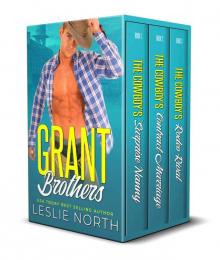 Grant Brothers Series: The Complete Series
Grant Brothers Series: The Complete Series The Billionaire Chef’s Baby (McClellan Billionaires Book 2)
The Billionaire Chef’s Baby (McClellan Billionaires Book 2) The Sheikh's Captive American (Zahkim Sheikhs Series Book 1)
The Sheikh's Captive American (Zahkim Sheikhs Series Book 1) The Sheikh King's Ward (Halabi Sheikhs Book 1)
The Sheikh King's Ward (Halabi Sheikhs Book 1) The Sheikh's Christmas Baby
The Sheikh's Christmas Baby The Sheikh's Amulet (Sheikh's Wedding Bet Series Book 3)
The Sheikh's Amulet (Sheikh's Wedding Bet Series Book 3) The Sheikh’s Accidental Heir (Sharjah Sheikhs Book 2)
The Sheikh’s Accidental Heir (Sharjah Sheikhs Book 2) The Sheikh's Pregnant Employee
The Sheikh's Pregnant Employee Safe and Sound (The Safe House Series Book 3)
Safe and Sound (The Safe House Series Book 3)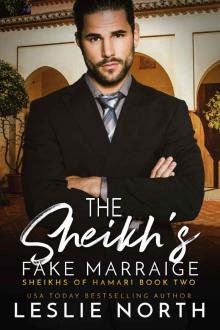 The Sheikh’s Fake Marriage (Sheikhs of Hamari Book 2)
The Sheikh’s Fake Marriage (Sheikhs of Hamari Book 2)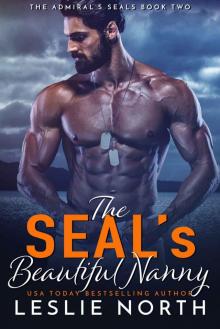 The SEAL’s Beautiful Nanny (The Admiral’s SEALs Book 2)
The SEAL’s Beautiful Nanny (The Admiral’s SEALs Book 2) SEAL Guardian (Brothers In Arms Book 3)
SEAL Guardian (Brothers In Arms Book 3)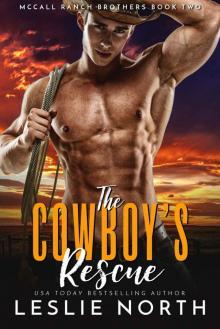 The Cowboy’s Rescue (McCall Ranch Brothers Book 2)
The Cowboy’s Rescue (McCall Ranch Brothers Book 2) The Billionaire's Pregnant Competition (The Billionaires Club Book 1)
The Billionaire's Pregnant Competition (The Billionaires Club Book 1) Billionaires & Babies: The Complete Series
Billionaires & Babies: The Complete Series The Rancher’s Inherited Family (McCall Ranch Brothers Book 1)
The Rancher’s Inherited Family (McCall Ranch Brothers Book 1) The Sheikh's Stubborn Lover (The Adjalane Sheikhs Series Book 2)
The Sheikh's Stubborn Lover (The Adjalane Sheikhs Series Book 2) The Billionaire’s Christmas Fiancée (Christmas with the Denton Billionaires Book 1)
The Billionaire’s Christmas Fiancée (Christmas with the Denton Billionaires Book 1) The Sheikh's Secret Princess
The Sheikh's Secret Princess The Billionaire's Ex-Wife (Jameson Brothers Book 1)
The Billionaire's Ex-Wife (Jameson Brothers Book 1)![Ride with the SEAL_Norse Security [Book One] Read online](http://i1.bookreadfree.com/i/03/20/ride_with_the_seal_norse_security_book_one_preview.jpg) Ride with the SEAL_Norse Security [Book One]
Ride with the SEAL_Norse Security [Book One]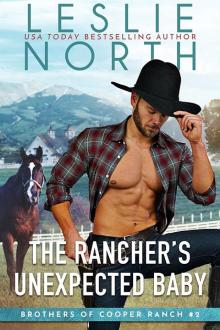 The Rancher’s Unexpected Baby: Brothers of Cooper Ranch Book Two
The Rancher’s Unexpected Baby: Brothers of Cooper Ranch Book Two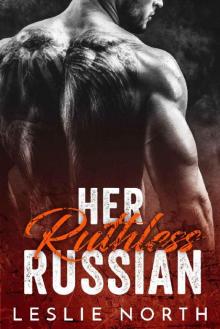 Her Ruthless Russian (Karev Brothers Book 1)
Her Ruthless Russian (Karev Brothers Book 1)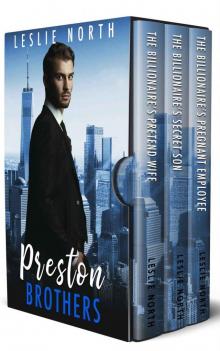 Preston Brothers The Complete Series
Preston Brothers The Complete Series The Sheikh's Furious Prisoner
The Sheikh's Furious Prisoner The Volkov Brothers Series: The Complete Series
The Volkov Brothers Series: The Complete Series A Sheikh for Christmas
A Sheikh for Christmas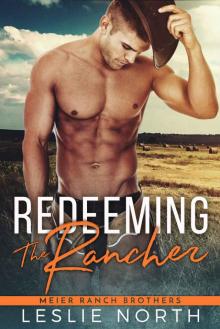 Redeeming the Rancher
Redeeming the Rancher The Sheikh's Pregnant Employee (Almasi Sheikhs Book 3)
The Sheikh's Pregnant Employee (Almasi Sheikhs Book 3) A Billionaire for Christmas
A Billionaire for Christmas The Sheikh's Determined Lover
The Sheikh's Determined Lover The Sheikh's Reluctant American (The Adjalane Sheikhs #3)
The Sheikh's Reluctant American (The Adjalane Sheikhs #3)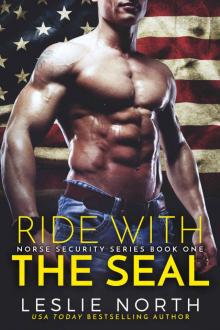 Ride with the SEAL
Ride with the SEAL Zahkim Sheikhs Series: The Complete Series
Zahkim Sheikhs Series: The Complete Series The Sheikh's Unforgettable Lover (The Sharqi Sheikhs Series Book 1)
The Sheikh's Unforgettable Lover (The Sharqi Sheikhs Series Book 1) Sheikha's Determined Police Officer (Botros Brothers Series Book 4)
Sheikha's Determined Police Officer (Botros Brothers Series Book 4) The Sheikh's American Bride (The Sharqi Sheikhs Series Book 2)
The Sheikh's American Bride (The Sharqi Sheikhs Series Book 2)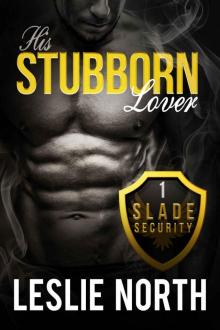 His Stubborn Lover
His Stubborn Lover The Sheikh's Defiant Girlfriend (The Botros Brothers Series)
The Sheikh's Defiant Girlfriend (The Botros Brothers Series) The Billionaire's Ex-Wife
The Billionaire's Ex-Wife The Russian's Secret Child (The Fedosov Family Series)
The Russian's Secret Child (The Fedosov Family Series) The Sheikh's Crown (Sheikh's Wedding Bet Series Book 2)
The Sheikh's Crown (Sheikh's Wedding Bet Series Book 2) The Sheikh's Unexpected Wife
The Sheikh's Unexpected Wife The Sheikh’s Secret Son (Sharjah Sheikhs Book 3)
The Sheikh’s Secret Son (Sharjah Sheikhs Book 3) Celi-Bet (Solomon Brothers #2)
Celi-Bet (Solomon Brothers #2) The Billionaire's Sexy Rival (Jameson Brothers Book 3)
The Billionaire's Sexy Rival (Jameson Brothers Book 3) The Sheikh's Christmas Baby (Shadid Sheikhs Series Book 3)
The Sheikh's Christmas Baby (Shadid Sheikhs Series Book 3) Royal Treatment
Royal Treatment The Sheik's Accidental Pregnancy
The Sheik's Accidental Pregnancy The Sheikh’s Contract Fiancée (Almasi Sheikhs Book 1)
The Sheikh’s Contract Fiancée (Almasi Sheikhs Book 1) Mafia Boss's Fearless Lover (The Karzhov Crime Family series Book 1)
Mafia Boss's Fearless Lover (The Karzhov Crime Family series Book 1) The Sheikh’s Surprise Heir: The Karawi Sheikhs Series Book One
The Sheikh’s Surprise Heir: The Karawi Sheikhs Series Book One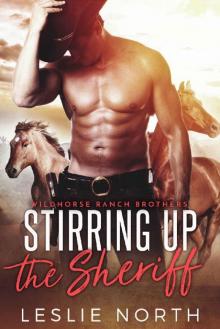 Stirring up the Sheriff (Wildhorse Ranch Brothers Book 3)
Stirring up the Sheriff (Wildhorse Ranch Brothers Book 3) Secret Billionaire's Stubborn Cowgirl (The Secret Billionaires, #1)
Secret Billionaire's Stubborn Cowgirl (The Secret Billionaires, #1) Her Relentless Russian (Karev Brothers Book 3)
Her Relentless Russian (Karev Brothers Book 3) SEAL Defender (Brothers In Arms Book 1)
SEAL Defender (Brothers In Arms Book 1) Mafia Soldier's Irresistible Lover (The Karzhov Crime Family Series Book 3)
Mafia Soldier's Irresistible Lover (The Karzhov Crime Family Series Book 3) The Sheikh's Tempting Assistant
The Sheikh's Tempting Assistant The Sheik's Desires Boxset
The Sheik's Desires Boxset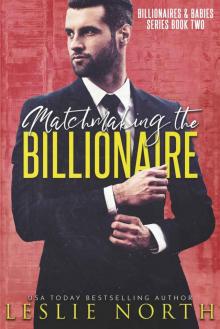 Matchmaking the Billionaire (Billionaires & Babies Book 2)
Matchmaking the Billionaire (Billionaires & Babies Book 2) Trusting the SEAL (Saving the SEALs Series Book 3)
Trusting the SEAL (Saving the SEALs Series Book 3) The Sheikh's Christmas Present (Shadid Sheikhs Series Book 2)
The Sheikh's Christmas Present (Shadid Sheikhs Series Book 2) The Sheikh’s Stubborn Assistant
The Sheikh’s Stubborn Assistant The Lord's Passionate Lover (The Royals of Monaco, #3)
The Lord's Passionate Lover (The Royals of Monaco, #3) The Sheikh’s Forced Bride (The Sharjah Sheikhs Series Book 1)
The Sheikh’s Forced Bride (The Sharjah Sheikhs Series Book 1) The Prince's Unwilling Lover (The Royals of Monaco Book 1)
The Prince's Unwilling Lover (The Royals of Monaco Book 1) The Sheikh’s Pregnant Fake Wife
The Sheikh’s Pregnant Fake Wife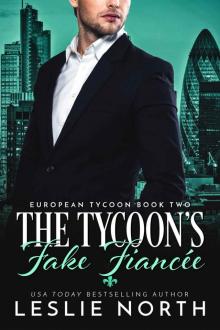 The Tycoon’s Fake Fiancée (European Tycoon Book 2)
The Tycoon’s Fake Fiancée (European Tycoon Book 2) Italian Billionaire’s Stubborn Lover
Italian Billionaire’s Stubborn Lover Greek Billionaire's Blackmailed Bride (The Rosso Family Series, #1)
Greek Billionaire's Blackmailed Bride (The Rosso Family Series, #1) The Sheikh's Christmas Maid
The Sheikh's Christmas Maid The Sheikh's Christmas Maid (Shadid Sheikhs Series Book 1)
The Sheikh's Christmas Maid (Shadid Sheikhs Series Book 1) Italian Billionaire’s Unexpected Lover
Italian Billionaire’s Unexpected Lover The Sheikh's Secret Bride
The Sheikh's Secret Bride The Sheikh's Unruly Lover (Almasi Sheikhs Book 2)
The Sheikh's Unruly Lover (Almasi Sheikhs Book 2) Secret Billionaire's Frosty Lover
Secret Billionaire's Frosty Lover SEAL Protector (Brothers In Arms Book 2)
SEAL Protector (Brothers In Arms Book 2) The Sheikh’s Pretend Fiancée
The Sheikh’s Pretend Fiancée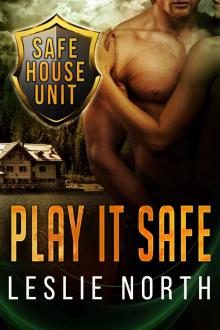 Play It Safe (The Safe House Series Book 2)
Play It Safe (The Safe House Series Book 2) Rose (Thorn Tattoo Studio Book 1)
Rose (Thorn Tattoo Studio Book 1) The Sheikh's Captive American
The Sheikh's Captive American Wired (The Solomon Brothers Series Book 1)
Wired (The Solomon Brothers Series Book 1) The Sheikh's Unexpected Wife (Zahkim Sheikhs Series Book 3)
The Sheikh's Unexpected Wife (Zahkim Sheikhs Series Book 3) The Romano Brothers Series
The Romano Brothers Series The Sheikh's Surprise Triplets (Azhar Sheikhs Book 3)
The Sheikh's Surprise Triplets (Azhar Sheikhs Book 3) Battle with the SEAL
Battle with the SEAL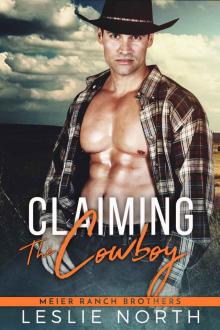 Claiming The Cowboy
Claiming The Cowboy The Billionaire’s Sham Girlfriend: The Beaumont Brothers Book One
The Billionaire’s Sham Girlfriend: The Beaumont Brothers Book One The Sheikh's Unruly Lover
The Sheikh's Unruly Lover Shooting the SEAL (Saving the SEALs Series Book 1)
Shooting the SEAL (Saving the SEALs Series Book 1) The Sheikh's Demanding Fiancée (The Botros Brothers Series)
The Sheikh's Demanding Fiancée (The Botros Brothers Series) Owned by the Navy Seal
Owned by the Navy Seal The Billionaire’s Stubborn Lover (The Maxfield Brothers Series Book 3)
The Billionaire’s Stubborn Lover (The Maxfield Brothers Series Book 3) The Sheikh's Fiery Lover (The Tazeem Twins Series Book 2)
The Sheikh's Fiery Lover (The Tazeem Twins Series Book 2) In Safe Hands (The Safe House Series Book 1)
In Safe Hands (The Safe House Series Book 1) The Sheikh's Pregnant Fling (Azhar Sheikhs Book 2)
The Sheikh's Pregnant Fling (Azhar Sheikhs Book 2) The Sheikh's Christmas Present
The Sheikh's Christmas Present Royal Service
Royal Service The Billionaire’s Tenacious Boss (The Maxfield Brothers Series Book 1)
The Billionaire’s Tenacious Boss (The Maxfield Brothers Series Book 1) Royal Order
Royal Order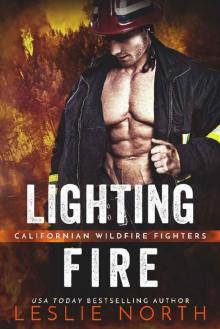 Lighting Fire
Lighting Fire Her Rogue Russian (Karev Brothers Book 2)
Her Rogue Russian (Karev Brothers Book 2) Fearless (The Solomon Brothers Series Book 3)
Fearless (The Solomon Brothers Series Book 3) The Sheikh's Diamond (Sheikh's Wedding Bet Series Book 1)
The Sheikh's Diamond (Sheikh's Wedding Bet Series Book 1) Mafia Hitman's Daring Lover
Mafia Hitman's Daring Lover Hacking the SEAL (Saving the SEALs Series Book 2)
Hacking the SEAL (Saving the SEALs Series Book 2) His Innocent Lover (Slade Security Team Series Book 3)
His Innocent Lover (Slade Security Team Series Book 3) The Prince's Pregnant Challenge (The Royals of Monaco, #2)
The Prince's Pregnant Challenge (The Royals of Monaco, #2) Undercover with the SEAL
Undercover with the SEAL Thorn (Thorn Tattoo Studio Book 2)
Thorn (Thorn Tattoo Studio Book 2) Mafia Enforcer's Sassy Lover (The Karzhov Crime Family Series Book 4)
Mafia Enforcer's Sassy Lover (The Karzhov Crime Family Series Book 4) The Sheikh's Pregnant Bride (The Jawhara Sheikhs Series Book 1)
The Sheikh's Pregnant Bride (The Jawhara Sheikhs Series Book 1)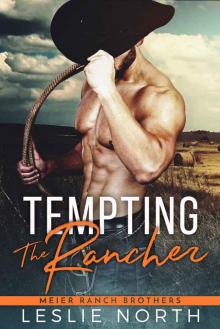 Tempting the Rancher
Tempting the Rancher Greek Billionaire's Uncontrollable Attraction (The Rosso Family Series Book 3)
Greek Billionaire's Uncontrollable Attraction (The Rosso Family Series Book 3) The Sheikh’s Island Fling
The Sheikh’s Island Fling![Battle with the SEAL_Norse Security [Book Three] Read online](http://i1.bookreadfree.com/i2/04/11/battle_with_the_seal_norse_security_book_three_preview.jpg) Battle with the SEAL_Norse Security [Book Three]
Battle with the SEAL_Norse Security [Book Three] The Sheikh’s Contract Fiancée
The Sheikh’s Contract Fiancée The Sheikh’s Tamed Bride
The Sheikh’s Tamed Bride The Sheikh’s Island Fling_Sheikh's Meddling Sisters_Book Two
The Sheikh’s Island Fling_Sheikh's Meddling Sisters_Book Two The Sheikh's Troublesome Bride
The Sheikh's Troublesome Bride A SEAL for Christmas
A SEAL for Christmas The Sheikh's Determined Lover (Zahkim Sheikhs Series Book 2)
The Sheikh's Determined Lover (Zahkim Sheikhs Series Book 2) The Sheikh’s Fake Fiancée (Azhar Sheikhs Book 1)
The Sheikh’s Fake Fiancée (Azhar Sheikhs Book 1)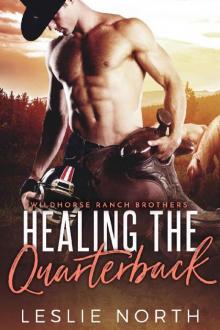 Healing the Quarterback (Wildhorse Ranch Brothers Book 2)
Healing the Quarterback (Wildhorse Ranch Brothers Book 2) The Sheikh's Resisting Lover (The Tazeem Twins Series Book 3)
The Sheikh's Resisting Lover (The Tazeem Twins Series Book 3) Greek Billionaire's Forbidden Lover (The Rosso Family Series Book 2)
Greek Billionaire's Forbidden Lover (The Rosso Family Series Book 2)![Undercover with the SEAL_Norse Security [Book Two] Read online](http://i1.bookreadfree.com/i2/04/11/undercover_with_the_seal_norse_security_book_two_preview.jpg) Undercover with the SEAL_Norse Security [Book Two]
Undercover with the SEAL_Norse Security [Book Two] Rescued by the Navy Seal
Rescued by the Navy Seal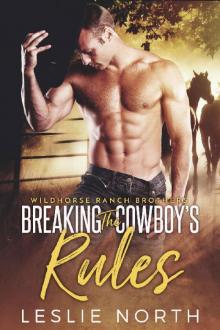 Breaking the Cowboy's Rules (Wildhorse Ranch Brothers Book 1)
Breaking the Cowboy's Rules (Wildhorse Ranch Brothers Book 1) CEO's Pregnant Lover
CEO's Pregnant Lover Royals of Danovar: The Complete Series
Royals of Danovar: The Complete Series The Sheikha's Forbidden Lover (The Tazeem Twins Series Book 5)
The Sheikha's Forbidden Lover (The Tazeem Twins Series Book 5) The Sheikh's Kidnapped Bride (The Sharqi Sheikhs Series Book 3)
The Sheikh's Kidnapped Bride (The Sharqi Sheikhs Series Book 3)